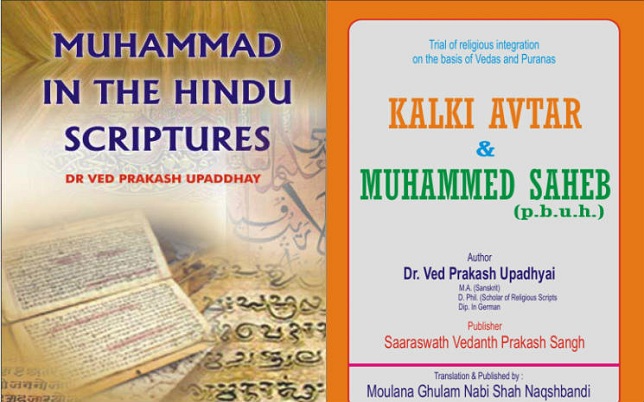Islam doesn’t require support from books of other religions for its truthfulness and veracity. Indeed Quran is the truth from Almighty Allah and Prophet Muhammad is the final Prophet to mankind from among the multitudes of Prophet sent by Allah.
All Prophets brought the Same Message
All Prophets brought the same essential guidance from Allah and they preached the same message to people about Belief in Oneness of God (Tauheed), Belief in the Prophethood (Risaalat) and the Belief in Hereafter (Qiyamah).
All Prophets Informed about Prophet Muhammad
All the Prophets before Muhammad gave news to their people about the coming of the last and greatest Prophet of Allah (Prophet Muhammad) and greatly emphasized the importance of obeying and following of Prophet Muhammad.
Allah has sent prophets to people of all communities to deliver His message to humanity who delivered the same essential message and this is why we find the mention of Prophet Muhammad in all religions of the world.
All Scriptures changed Except Quran!
It is a well known fact that most of the messages contained in earlier scriptures have been distorted by their followers as time passed and people changed scriptures to suit their desires and demands.
Quran is the only scripture in the world which is free from any kind of alteration, corruption, distortion, interpolation, excess etc since its first day of revelation to Prophet Muhammad.
All Divine Religions Inform of Prophet Muhammad
The purpose of this article is only to show that prophecy about prophet Muhammad is present in scriptures of all religions who claim to have Divine origins.
This doesn’t entail in any sense that these scriptures are to be followed after coming of Quran and Prophet Muhammad.
The Quran is the Last Message of Allah and belief in its truthfulness is essential for salvation in this world and hereafter.
Vedas – The Greatest Hindu Scriptures
Numerous prophecies of the advent of the Holy Prophet are found in the sacred books of the Hindus. There are three divisions of these books—the Vedas, the Upanishads and the Puranas.
The Brahmanas are nothing but a commentary of the Vedas, still it is included in the revealed books (Shruti).
There are four principal divisions of the Vedas, although according to their number, they amount to 1131 out of which only about a dozen are available.1
The Rig Veda, the Yajur Veda and the Sam Veda are considered to be the more ancient books, the Rig Veda being the oldest.
The Rig Veda was compiled in three long and different periods of time.2 According to Manu, the above mentioned are the three old Vedas which are also known as ‘Trai Vidya’ or the Triple Sciences.3 The fourth one, Atharva Veda is of a later date.
Various Problems with Vedas
Opinions greatly differ as to the date of compilation or revelation of the four Vedas. European Orientalists, however, are more or less unanimous in their research; but there is an unbridgeable gulf of difference between various Hindu sects and scholars.
One scholar holds that the Vedas were revealed one thousand three hundred and ten millions of years ago,4 and according to others they are not more than four thousand years old.5
Similarly, a great difference is found in the various accounts about the places where these books were revealed and the Rishis (Holy Saints) to whom these scriptures were given.
Notwithstanding these differences, the Vedas are the most authentic scriptures of the Hindus and the real foundation of the Hindu Dharma.
Upnishads and Puranas – Great Hindu Scriptures
Next in order of superiority and authenticity to the Vedas are the Upanishads. Some Pandits, however, consider the Upanishads to be superior to the Vedas.6,7,8,9 The Hindus are proud of these philosophic treatises and in the Upanishads as well, we find a claim to superiority over the Vedas.10
The next authentic books after the Upanishads and the most widely read of all are the Puranas. These books are easily intelligible and available at every place, as the Vedas are difficult to understand and rarely found. The Hindus show great reverence to these books and read them with much interest and faith.
The Puranas comprise of the history of the creation of this universe, the history of the early Aryan tribes, and life stories of the divines and deities of the Hindus. Maha Rishi Vyasa has divided these books into eighteen voluminous parts.
Vedas vs Puranas
The majority of the Hindu people believes that the Vedas too attest the truth of the Puranas, which shows that the Puranas are more authentic and more ancient.
In the Atharva Veda we find: “Verses and songs and magic hymns, Purana, sacrificial text—All the celestial Gods Whose home is heaven, sprang from the residue”.11
Again we find: “He went away to the great region. Itihasa and Purana and Gathas and Narashansis followed him”12
Similarly in the Rig Veda a mention is made of Puranas: “So by this knowledge (of) Puran Yajua our fathers raised up to Rishis”. 13
A reference to Puranas is also found within Chhandogya Upanishad.14
Unfair Attitude of Hindu Pandits (Brahmans)
All these references show that the Puranas are also revealed books like the Vedas, and as regards the age of revelation, they were either revealed simultaneously with the Vedas or some time before.
In a word, the sanctity and reverence of the Puranas is admitted and recognized in all the authentic books of the Hindus.
But in spite of all this, some Pandits have today begun to reject these collections simply because they find in them numerous prophecies and vivid signs of the truth of the Prophet Muhammad.
Instead of having believed in the Prophet Muhammad and thus obeying their great and Holy Rishis and realizing the truth of their sayings, these Pandits have thought it best to totally refuse credence to what the Puranas contain.
But the Vedas have clearly testified to the truth of the Puranas and it is recorded that just as the Vedas were revealed from God, in like manner, the Puranas too were revealed by Him.
Some Objections & their Answers
Objection 1. Sometimes however it is pleaded that the present Puranas are not the same collection of which the Vedas speak, the real books having been lost. But this contention is not correct.
Answer: It is impossible and far from truth that all the Puranas which were so widely read and keenly studied, could have fallen in oblivion and totally wiped out from the surface of the earth, and the Vedas, which only a few could read and understand, remained intact up to this time.
Objection 2. It is further said that these prophecies were added to the Puranas at a later date.
Answer: Even if this argument is accepted, then the million dollar question remains who has edited or changed the Puranas in favour of Islam and Prophet Muhammad? Obviously it cant be Muslims!! Muslims were nowhere in picture in ancient India!!
Seeing clear prophecies of the Arabian Prophet in their books, the Pandits began to clamour that the Puranas were corrupted.
Moreover, it is nonsensical to think that all the Pandits and the learned divines of the Hindus could have assembled at some place and added prophecies favoring Islam and Prophet Muhammad to the Puranas.
There are at the same time, so many sects among the Brahmans and each sect is strongly opposed to the other, it was impossible for them to agree to such a change.
Even if we assume that such an event has happened then such an event of so remarkable significance would have been deeply etched in memories of Hindu scholars.
A copy of a Puran will be found in almost every Brahman’s house, and it is really strange that so far the world has not seen any collection without these prophecies.
And the most ridiculous thing is that corruption is said to have been made in favour of the Prophet Muhammad and against their own religion.
It was very much possible that something could have been added against these prophecies about Prophet Muhammad or to change their text, but it is simply absurd to think that the Hindu Pandits added something against their own religion and conviction.
Thus, we appeal to our Hindu brethren to give a serious consideration to this question. We invite our Hindu brothers to carefully study their revealed scriptures, which will inevitably lead them to understand the glory of the Prophet Muhammad and let them declare their faith in him.
References:
1. Ek shatam adhvaryo shakha, shasr vertama Sam Veda, ek vinshti dhava Richyam, navdha Atharvano Veda (There are 101 branches of Yajur Veda, 1000 of Sam Veda, 21 are of Rig Veda, and nine types of Atharva Veda, i.e. 1131). Maha-Bhashya of Patanjli.
2. Abhinash Chandra’s Rigvedic India, Intro, p. VIII.
3. Trayam Brahm sanatnam. Manu. 1.23. 2 : 76, 77, 118. 3 : 2. 9 : 188.
4. Dyanand’s Satyarth Parkasha.
5. Mahatma Tilak’s “Arctic Home in the Vedas”.
6. Pandit Radha Krishnan’s Philosophy of the Upanishads, p. 16.
7. Sacred Books of the East vol. I.
8. Introduction to the Upanishads, p. xiii.
9. Lectures by Raja Ram Mohan Roy.
10. Manduk Upanishud, 1. 1. 4-6. Chhandogya vii. 1-2. Shatpath Br. X 3.5-12
11. The Atharva Veda, XI: 7. 24.
12. Atharva Veda, XV : 6, 12.
13. Rig Veda, X : 130, 6.
14. Chhan. VII; 1-2.

